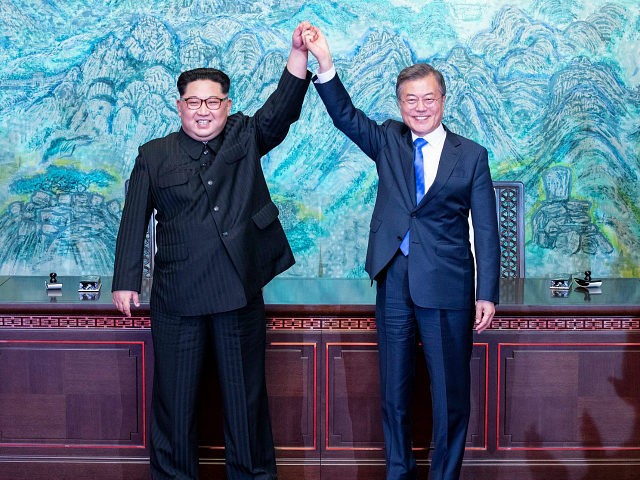Newly-elected South Korean lawmaker Ji Seong-ho – who became a human rights activist there after enduring extreme brutality in his home state of North Korea – told Radio Free Asia (RFA) in an interview published Tuesday that he believed his native country would soon be reunited with his adoptive one.
Ji became the object of international attention in 2018 after being invited to attend President Donald Trump’s State of the Union address that year. There, he waved the crutches he had used to escape North Korea after becoming disabled in a painful accident as a child while trying to steal coal to survive. Speaking to RFA, he described himself as a kotjebi, a term used for beggar children in the country, and expressed hope that those children would hear of his election and be inspired to dream of a different future than the bleak realities the repressive communist state offers.
“I want to tell them, hang on to your life through whatever means possible. If I am the first kotjebi-turned lawmaker, you can be the second, the third. Bring changes to North Korea. Go to school and learn,” Ji told RFA, sending a message to the children who, like him, belonged to the lower classes of North Korean society. “Have courage because your hardship is not because of yourself, but because of the system in North Korea. Make a contribution to the country. But I know this can happen only if free democracy is achieved in North Korea – only if the two Koreas are unified.”
North Korea employs a strict caste system known as songbun, which splits families by their historical loyalty to the family of dictator Kim Jong-un. Christians, political dissidents, or those who have ever appeared slightly less than enthusiastic about the regime are awarded lower songbun and kept out of wealthier areas of the country like Pyongyang. The Kim family itself has the highest songbun, with the power to travel even abroad.
Ji predicted in his interview with RFA that the two Koreas would soon be united and hoped that in his new position as lawmaker, he could make an impact on democratizing his home country.
“I am planning to draft legislation to improve the lives of disabled people in this country. But I also think reunification of the two Koreas is not far off but is coming soon. So I will help North Korean defectors in the South get settled in the country and help them lead successful lives,” Ji said.
Ji described himself as “moved to tears” by his election. He won a position in the National Assembly through proportional vote – meaning voters chose his party, which appointed him – on April 15. Along with him, Thae Yong-ho, a former North Korean diplomat, became the first defector to win a seat via direct election. Unlike most governments, which have either a direct election system or a proportional one, South Korea’s National Assembly uses both methods.
“I was reminded of my father who was tortured to death after being seized by North Korean police while defecting from the country,” Ji told RFA. “I was also reminded of some of the people in my hometown who starved to death along with millions of others in the rest of the country.”
Ji spent much of his life after arriving in South Korea – via an arduous route through China – as a human rights advocate, and hinted that he would continue to use his position to attempt to bring to light many of the human rights abuses in his country. In North Korea, as a child, he was run over by a train while trying to steal coal to sell in exchange for food and lost several limbs.
South Korea estimates that a little over 30,000 North Korean refugees live in the country. Most cross from China, as the border between the Koreas is one of the most militarized in the world. The rare few who cross directly tend to be soldiers risking their lives by abandoning their posts. Officials say there was a sharp decline in the number of North Koreans attempting to escape to the South in 2019, with little over a thousand making it to freedom. China has a policy of returning North Koreans to their home countries if caught, leading to their deaths or lifetime stays at the nation’s vast labor camps. There is believed to be a direct relationship in the number of successful arrivals from North Korea to South Korea and the number of refugees caught – meaning a dip in arrivals does not suggest fewer are trying to escape, but rather that China has caught and repatriated more of them.

COMMENTS
Please let us know if you're having issues with commenting.